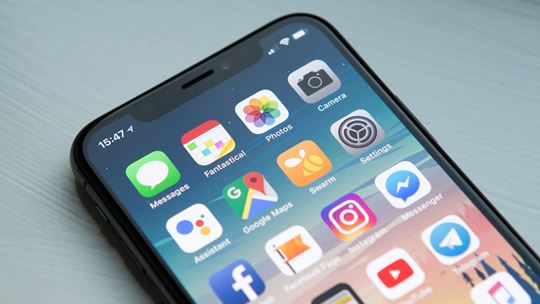Should my business have an app?
As a retail and marketing tool, mobile apps have become increasingly appealing to businesses. According to App Annie, consumer spending in app markets will reach £130 billion in 2022.
However, is an app required for every business? There are several elements that are crucial to consider if you're going to determine if your business needs an app, let alone making any potential app a long-term success. We'll break down some of the key considerations in app development, that'll help inform your final decision.
Does your business need an app?
As the information technology industry develops, more and more people opt for mobile and tablets as a quick and simple way to contact businesses. So, if you're confident in pursuing the app path, be sure it's worth your business' time and money.
What exactly does 'mobile-friendly' imply? In today's world, it's all about high-performance, high-speed Internet, and handy push alerts. Is it, however, necessary for your business?
Assume you've created a quick mobile app with a great user interface and flexible design. There is a risk that, due to the enormous work required to manage, replicate, and integrate many codebases, it never truly replaces your website. Therefore, as the first step in implementing a mobile outreach plan, a mobile/adaptive website makes sense.
As a result, any business must base its interactions with customers on three fundamental principles:
- Customers' choices should be respected.
- Introducing a culture of aggressive stimulation that cancels out the consideration of competition
- Using cutting-edge technologies to enhance the user's experience.

Benefits of app development for businesses
The fundamental operation of those mobile phones (apart from making phone calls, of course) is to run a slew of apps that fulfil practically every conceivable need.
Businesses from all over the world have begun to migrate from the physical world of handing out brochures, printing adverts, and hanging billboards to the mobile realm, offering a vast assortment of items. Exactly how can the introduction of an app replace the aforementioned? How, in a nutshell, can an app aid your business?
- Increase e-commerce sales
- Compete with other corporations on a larger scale
- Directly communicate with customers
- Reduce the number of steps in the customer journey
- Create a sense of loyalty amongst customers
- Increase the value of your brand
- Make a channel for direct marketing
- Provide a bespoke service
What is your goal?
Consider how you'd utilise a mobile app for your business and what specific functionality you'd require before designing one.
In many ways, a dedicated mobile app can help current and potential clients. It can help you attract new customers and better serve existing ones by advertising new products and services, special deals, loyalty programmes, and other benefits for in-store and online shopping.
In addition, a mobile app provides constant, real-time communication with your customers. They can examine available items, check your hours, find locations, obtain directions, and access any other information you choose.
Who are you trying to reach?
Most firms aim for a broad consumer base, with customers ranging in age from 18 to 65. Younger users (13-24 years old) visit apps more than twice as often as those over 45, according to App Annie; nevertheless, they are more likely to abandon an app if it does not meet their needs.
When they do use apps, those over 45 prefer mobile browsers to apps, despite the fact that they spend 25% more time in apps than younger users. Users between the ages of 25 and 44 have a high level of app engagement, particularly with retail apps.

How mobile-oriented are your customers?
Unsurprisingly, the same generation that adores smartphone apps and eagerly awaits the arrival of new ones spends an inordinate amount of time experimenting with them. Younger audiences are more familiar with applications and how they work. During their mobile usage, they consume a substantial amount of data.
Users aged 25 to 44 are the ideal demographic for selling things online via mobile or advertising an in-store experience, thanks to the popularity of retail apps.
Because they are more familiar with desktop computer use, those 45 and older have less awareness of mobile apps and how they work. If an app offers recognisable features and an easy-to-use UI, they are more inclined to use it.
What do your customers desire?
Keep in mind what clients want if you're thinking of creating a dedicated app. Customers rely on applications that give a quick and easy-to-use interface, as well as apps that feature better rates or promotions not seen on other platforms, such as the company's website, according to data from Heady.
Because of its personalisation functionality, younger consumers were more inclined to choose an app, according to the study. Furthermore, apps that integrate the usage of mobile wallets for payment, such as Apple Pay and Google Pay, are more likely to be prioritised by people with an annual income of less than £40,000. As such, mobile wallet integration is a must for all new apps.
How does an app improve your website?
When it comes to mobile websites vs. applications, mobile apps are the more convenient option. Even if your website was developed as a mobile-friendly, responsive site that effortlessly transitions from desktop to mobile browsers and back, a dedicated app can use your present online presence.
Like having a phone, having a website with general information about your firm is a must. And, just as with a phone, your clients must put in effort to use it by finding your homepage, bookmarking your site, and navigating specific content. A mobile website, even the most user-friendly one, is more complex and time-consuming than a mobile app.
Apps are designed to be used on the go. They don't have to adapt to a new format, so they can focus on more pressing, customer-centric issues. Users prefer mobile apps over mobile websites, according to VWO, an A/B testing tool platform, since they offer better personalisation and efficiency, as well as other advantages like notifications, offline mode, and speedy loading times.
What is your strategy?
After you've decided to construct an app, the following step is to plan your strategy. Is it better to use an off-the-shelf app builder or engage a professional mobile app developer to construct one for you from the ground up?
AppMachine, BuildFire, GoodBarber, and Shoutem are examples of app builders. These tools are fantastic resources for anyone who is willing to put in the effort to learn how to use them. While using software to build your app isn't difficult, it does take time, which you may not have – especially if you're also running a business. In that scenario, try enlisting the help of someone with more experience.

App development 'need to knows'
The world of mobile app development is always changing. When a new operating system version with unique features is released every six months or so, there will be adjustments and new considerations.
Some Android and iOS updates may cause app behaviour to alter. It's vital to stay up to speed on upgrades and new innovations to avoid incompatibility or cybersecurity risks. It's important to remember that updating your mobile app may come with a cost, so bear this in mind before making your decision to proceed with app development.
Six key steps in app development
The app development process involves six critical steps, regardless of the project you wish to bring to life. You can design your app more quickly and efficiently if you break the project down into the following basic steps:
- Idea: Determine what problem your app solves, who you're targeting with it, why its features are significant, and whether similar apps exist already.
- Design an interface that allows users to navigate the app with ease.
- Development: Write your app's code, refine it, and begin preliminary testing.
- Testing: Determine the app's quality, find any flaws, and figure out how to make it better.
- Publish your programme on marketplaces like the Apple App Store and Google Play Store after it's bug-free and ready to go.
- Create a marketing strategy to encourage consumers to download your app and provide feedback on how to increase user engagement.

A necessity?
The advantages of mobile apps for business are becoming increasingly obvious in a world that shows no signs of slowing down. The question is no longer 'does my business need a mobile app?' but rather 'how can I have an App built for my business?'.
cab engine has extensive expertise in designing mobile applications for companies in a variety of industries. Please use our contact form to get in touch with us about developing a mobile app for your company.
